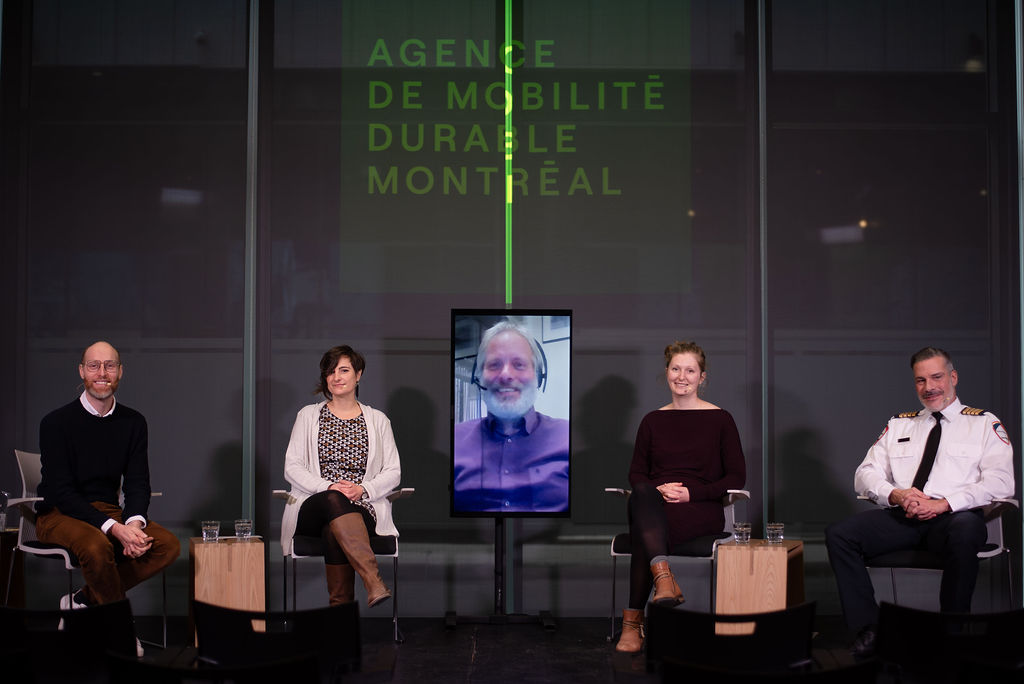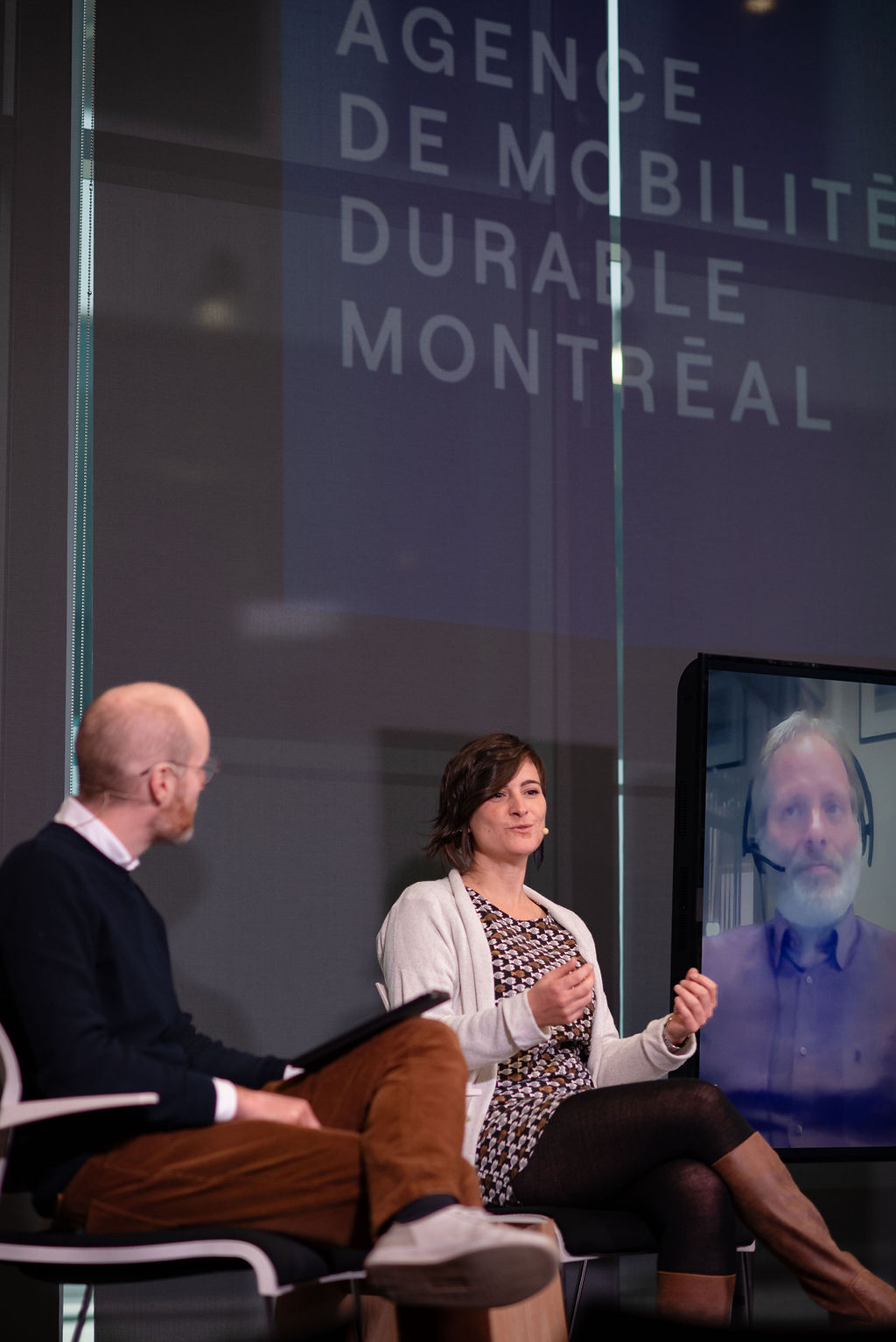Parking enforcement: far beyond tickets
Parking enforcement has historically been undervalued but is nevertheless essential for our cities. It gives value to mobility measures and ensures the safety of the population, thereby enhancing the city’s accessibility and contributing to its economic vitality.
For the Agence’s fifth panel, the following national and international experts came together to discuss the impact of parking enforcement on sustainable mobility:
- Magali Bebronne – Program Director, Vélo Québec
- Éric Gantelet – President, SARECO
- Pauline Guyomard – Transportation Planning Advisor, Transportation and Smart Mobility Department, City of Québec
- Sylvain Sauvageau – Executive Director of Parking and Mobility Control and Surveillance, Agence de mobilité durable de Montréal
The evolution of parking enforcement
The City of Montréal’s parking enforcement division was created 44 years ago. According to Sylvain Sauvageau, Senior Director of Parking and Mobility Control and Surveillance at the Agence de mobilité durable de Montréal, the City’s decision was driven by the increasing rate of offences, such as illegal and unpaid parking. Thirty years later, the parking enforcement division became a part of the Service de police de la Ville de Montréal (SPVM).
In 2020, the Agence de mobilité durable de Montréal was formed to take over parking enforcement activities from the SPVM. In the words of Sylvain Sauvageau, “Our approach today is based on customer service. We respond to users’ needs, and to their traffic and safety concerns.” As an example, he mentioned offences related to accessible parking spaces, bike paths and school zones.
Éric Gantelet, President of SARECO, pointed out an important parking management change in France: “Before 2018, when parking was managed nationally, the average payment rate was 20%. This situation changed drastically when enforcement was transferred to the local level. Now, we have compliance rates ranging from 70% to 80%.” Éric Gantelet believes that this phenomenon, which is being seen all over Europe, proves that parking enforcement has an impact on the population’s compliance with the law.
The technology used by parking enforcement officers has come a long way from handwritten tickets! Éric Gantelet explained that “technology changes to keep up with the ever-growing complexity of enforcement of parking and mobility options.” He is seeing two major technological trends in European cities: the use of cell phones to pay for parking, and the readiness of LPR (licence plate recognition) technology, which appears to make enforcement operations three to four times more effective.
Sylvain Sauvageau is a firm believer that LPR technology, which is also being developed in Montréal and Québec City, “will revolutionize parking enforcement officers’ efficiency and day-to-day routines, especially for offences relating to curbside parking, short-term paid spaces and residents-only parking stickers.”
A city without enforcement
Our experts agree that a city without enforcement would be unsafe for its population. Illegal parking would skyrocket, impeding not only the city’s traffic flow, but also the economic vitality of its businesses.
According to Magali Bebronne, Program Director at Vélo Québec, a city without enforcement is one in which some of the population would pay more than others for services that they do not use. She said that when people who choose to break the law do not pay for their offences, the whole community pays the price.
“No enforcement would lead to a city with lower-quality public spaces,” she added. Similarly, Pauline Guyomard, a transportation planning advisor in the City of Québec’s transportation and smart mobility department, claimed that a lack of enforcement would be detrimental to cities’ public infrastructure. This infrastructure would give way to cars, which eat up all the space allocated to them, to the detriment of sustainable mobility.
She concluded that cities just could not exist without enforcement. “There is always some form of passive enforcement by citizens who have expectations, and who call the City to report offences and ensure enforcement,” she said.
The challenges of parking enforcement
The panellists reported that mobility needs and practices are becoming more and more numerous and complex; parking enforcement strategies have many more points to monitor and juggle. Among these, the panel experts named bike paths, car sharing, accessible parking spaces and electric vehicles. In Paris, for example, parking spaces reserved for specific needs make up between 30% and 40% of the total number of spaces—a proportion that Éric Gantelet says is constantly on the rise.
“We can’t just create new physical space, so there are always sacrifices to be made,” explained Pauline Guyomard. “There’s a cost that comes with taking up even one parking space in some neighbourhoods.” This is why she emphasizes the need to infuse an overall vision of these issues into parking policies in order to determine how to act in each sector and which users should be prioritized.
Despite the importance of parking enforcement for cities and the well-being of the population, another major challenge highlighted by the experts is the negative public perception of parking enforcement officers and the limited recognition they are given. Nevertheless, Sylvain Sauvageau is optimistic that things will change in the near future. “I find it heartening,” he said, “to see organizations care more about promoting this occupation than they used to. This very panel is an excellent example of that!”















